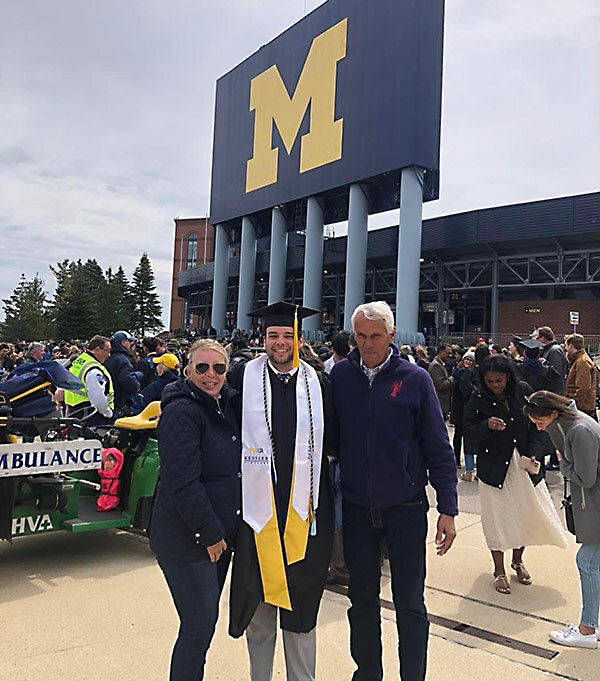Congrats! YouŌĆÖre the first in your family to get into college. Now what?
Loading...
Huanying YehŌĆÖs academic ambition began in 2016 when her family moved to Sacramento, California, from Taiwan. She started high school barely able to speak English.
Her parents would write words from the dictionary on flashcards ŌĆ£and encourage me to join them for a study session,ŌĆØ she remembers.┬Ā
In 2020, Ms. Yeh was accepted at highly selective Johns Hopkins University in Baltimore, which her family couldnŌĆÖt afford. She hoped she would qualify for need-based financial aid.┬Ā
Why We Wrote This
As more attention is paid to first-generation college students, more is known about how to support them ŌĆō and about how to help people successfully access and graduate from college.
That year, the university joined the , an initiative designed to assist first-generation students academically and financially. Ms. Yeh, whose parents never finished college in Taiwan, became one of the schoolŌĆÖs first recipients.
As educators wrestle with the best way to combat declining interest from Generation Z students in attending college, many agree that exorbitant cost is a big factor. For first-generation college students in particular, hurdles can also include not knowing how to navigate campuses, financial aid forms, and the pressures of cultural change as they carry the hopes of their families. To help these undergraduates ŌĆō and to broaden the number of people who have access to college ŌĆō organizations are honing their support to focus on everything thatŌĆÖs needed to achieve a degree.┬Ā
ŌĆ£ItŌĆÖs not just the money that makes it difficult for first-gen students to go to college,ŌĆØ says Katharine Meyer, an educational policy scholar and a fellow at the Brookings Institution. ŌĆ£ItŌĆÖs the college knowledge thatŌĆÖs necessary to go to and through an institution that can be really hard to navigate.ŌĆØ
Over the past decade, more resources and effort have been devoted to first-generation students, who make up over a third of undergrads. The help ranges from online tools, such as the website ,┬Āto an initiative first-generation faculty with students on University of California campuses.
This week, some 200,000 high school seniors who are first-generation or from low-to-moderate-income homes were offered ŌĆ£direct admissionŌĆØ via the Common Application portal based on their grade point averages. In a first, students were learning they had been accepted sometimes before finishing the application. The 70 participating schools are in 28 U.S. states, reports. Students will know for sure they have a place to attend college, but they will still have to figure out costs and any financial aid.┬Ā
The Kessler collaborative, which started as a need-based scholarship program in 2008, was revamped in 2017 to focus on first-generation students. Ten new schools were added in 2022, with the help of private funding, and welcomed students this fall. Philanthropists Judy Kessler Wilpon and Fred Wilpon, a first-generation student himself, are founding donors and continue to support the collaborative.┬Ā
Currently there are 808 Kessler scholars enrolled at 16 public universities and private institutions. Participating schools agree to meet 100% of every studentŌĆÖs financial need with help from Kessler. All of the students have financial needs, and at least 60% of participants are eligible for Pell Grants, meaning they qualify as having exceptional need. Kessler also offers career advising, peer mentoring, and alumni-networking events.
Johns Hopkins, which already had infrastructure in place for first-generation, limited-income students, steered Ms. Yeh toward Kessler, which helped her get a free education. Brent Fujioka, who oversees the initiative at the university, notes that first-generation students are among the ŌĆ£best and brightestŌĆØ heŌĆÖs worked with, but that they are ŌĆ£being asked to operate within an institution that wasnŌĆÖt designed with them in mind.ŌĆØ
The university coaches them to connect with faculty early on and encourages them to find research opportunities. Ms. Yeh, an electrical engineering and public health major, is currently studying the movements of electric fish in altered environments. She ultimately wants to develop health-related technological devices.┬Ā
ŌĆ£For me, the transition was definitely pretty drastic, because during high school I was still adjusting to the English-speaking community. I wasnŌĆÖt really involved in a lot of student organizations or the [high school] campus itself,ŌĆØ Ms. Yeh says. ŌĆ£So during college, I was eager to make a bigger impact.ŌĆØ
The stakes are high for first-generation students in terms of future earning potential. Households headed by a earn twice what non-college graduate households earn, at around $100,000 and $50,000, respectively, says Richard Fry, an economist and researcher for the Pew Research Center. According to a Pew study, those numbers increase for a second-generation college graduate household to almost $136,000 annually.
Working with first-generation cohorts to help them graduate is a goal of groups like Kessler. Research that more than a third of first-generation students will leave school before completing a degree.┬Ā┬Ā
Gail Gibson, executive director of the Kessler collaborative, says making sure students graduate is important. Kessler recently released its first findings on the 2017 inaugural class at Michigan, which graduated in 2021. The results are promising, says Dr. Gibson, who ran the program in those early days.┬Ā
The inaugural cohort had an 83% graduation rate within four years. This was almost equal to the 84% rate for students who were not first-generation and who started at the same time. Kessler scholars also fared better than other first-generation students who were not associated with the program, whose four-year graduation rate was 75%.
Kessler leaders are learning to pivot as the collaborative progresses. They are focusing on building one-on-one relationships with students on campus, for example, says Dr. Gibson, as opposed to just letting them know services are available. While making a strong push to introduce first-year students to campus life, they have also learned to keep up with programming to help upperclassmen stay engaged. ┬Ā
Cameron Russell, a four-year Kessler scholar at Michigan, graduated in April. He is now enrolled in a Ph.D. program in biochemistry at Emory University in Atlanta. His journey took him from Crowley ŌĆō a small town in the southern part of Louisiana ŌĆō to Ann Arbor, Michigan,┬Āand the 50,000 students at┬Āthe stateŌĆÖs flagship university.
His mother, a rural mail carrier, and father, a crawfish farmer, always pushed him toward college, even though they didnŌĆÖt have degrees. But his familyŌĆÖs encouragement had limitations.
ŌĆ£When youŌĆÖre just starting out as a first-generation student, where do you start? What do you do? How do you prepare for college when no one in your familyŌĆÖs been before?ŌĆØ Mr. Russell says he asked himself.
ŌĆ£I always had my familyŌĆÖs support to talk to them. But they couldnŌĆÖt give me advice on Michigan, because they had never been, but also they couldnŌĆÖt give me advice on how to talk to professors, how to communicate your needs to advisers, or how to find resources at the university,ŌĆØ Mr. Russell says.
He traveled to bitterly cold Michigan his first semester without a winter coat because he didnŌĆÖt know any better, he says. Other freshmen students, equally green to the new world theyŌĆÖd encountered, left him temporarily flustered when they assumed that he was racist because he was from a small farming community with a different way of living. Things got better.
ŌĆ£Kessler gave me the opportunity to come into my own as a first-generation college student,ŌĆØ Mr. Russell says, adding that ŌĆ£it really shaped me and the community of really great friends who IŌĆÖve made through it who all share that first-generation identity with me.ŌĆØ






